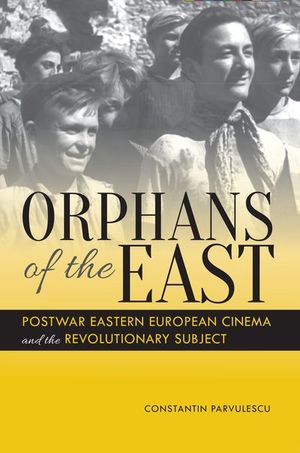Orphans of the East
Published by Indiana University Press
An analysis of films produced in post-World War II Eastern Europe featuring the trope of the orphan, and the issues these characters addressed.
Unlike the benevolent orphan found in Charlie Chaplin’s The Kid or the sentimentalized figure of Little Orphan Annie, the orphan in postwar Eastern European cinema takes on a more politically fraught role, embodying the tensions of individuals struggling to recover from war and grappling with an unknown future under Soviet rule. By exploring films produced in postwar Hungary, the German Democratic Republic, Czechoslovakia, Romania, and Poland, Constantin Parvulescu traces the way in which cinema envisioned and debated the condition of the post-World War II subject and the “new man” of Soviet-style communism. In these films, the orphan becomes a cinematic trope that interrogates socialist visions of ideological institutionalization and re-education and stands as a silent critic of the system’s shortcomings or as a resilient spirit who has resisted capture by the political apparatus of the new state.
“By using the trope of an orphan Constantin Parvulescu demonstrates how films made in countries such as Hungary, East Germany, Poland, Czechoslovakia and Romania reflected on the specific problems affecting Eastern Europe after 1945, such as the loss of population, economic backwardness, the legacy of the Holocaust, while engaging in wider debates, especially the superiority of socialism over capitalism. Economically and elegantly written, it demonstrates that cinema produced in the periphery can be central to our understanding of films as ideological tools. This is one of the best books on Eastern European cinema ever written.” —Ewa Mazierska, University of Central Lancashire
“Groundbreaking. . . . The author’s comparative, transnational perspective in chapters devoted to close textual analyses of each narrative demonstrates the value of reading film as a primary source for understanding the relationships among state power, intergenerational trauma, and revolutionary subjectivity. Parvulescu’s highly original portrayal of a landscape of parentless children evokes the trauma of war and the specificity of the socialist experiment in the former Eastern Bloc.” —Catherine Portuges, University of Massachusetts-Amherst
“Parvulescu has taken a highly innovative approach to socialist and post-socialist cinema in the region, and one that is vividly illustrated by a superb selection of films.” —Studies in European Cinema
Unlike the benevolent orphan found in Charlie Chaplin’s The Kid or the sentimentalized figure of Little Orphan Annie, the orphan in postwar Eastern European cinema takes on a more politically fraught role, embodying the tensions of individuals struggling to recover from war and grappling with an unknown future under Soviet rule. By exploring films produced in postwar Hungary, the German Democratic Republic, Czechoslovakia, Romania, and Poland, Constantin Parvulescu traces the way in which cinema envisioned and debated the condition of the post-World War II subject and the “new man” of Soviet-style communism. In these films, the orphan becomes a cinematic trope that interrogates socialist visions of ideological institutionalization and re-education and stands as a silent critic of the system’s shortcomings or as a resilient spirit who has resisted capture by the political apparatus of the new state.
“By using the trope of an orphan Constantin Parvulescu demonstrates how films made in countries such as Hungary, East Germany, Poland, Czechoslovakia and Romania reflected on the specific problems affecting Eastern Europe after 1945, such as the loss of population, economic backwardness, the legacy of the Holocaust, while engaging in wider debates, especially the superiority of socialism over capitalism. Economically and elegantly written, it demonstrates that cinema produced in the periphery can be central to our understanding of films as ideological tools. This is one of the best books on Eastern European cinema ever written.” —Ewa Mazierska, University of Central Lancashire
“Groundbreaking. . . . The author’s comparative, transnational perspective in chapters devoted to close textual analyses of each narrative demonstrates the value of reading film as a primary source for understanding the relationships among state power, intergenerational trauma, and revolutionary subjectivity. Parvulescu’s highly original portrayal of a landscape of parentless children evokes the trauma of war and the specificity of the socialist experiment in the former Eastern Bloc.” —Catherine Portuges, University of Massachusetts-Amherst
“Parvulescu has taken a highly innovative approach to socialist and post-socialist cinema in the region, and one that is vividly illustrated by a superb selection of films.” —Studies in European Cinema
BUY NOW FROM
COMMUNITY REVIEWS

